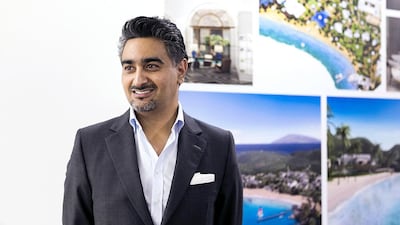Issues of citizenship and nationality have come to the fore in a big way in the post-Brexit world, with many commentators focusing on the negative repercussions for the British, European and global economies.
On the other hand, Munaf Ali, chief executive of the hotels group Range Developments, sees this as a unique business opportunity, and has already recorded a spike in interest for his services. “Even before Brexit, there was a lot of demand from British people who don’t like paying so much tax. Since the vote, we’ve seen even more inquiries, but now it’s from people who are worried about ease of travel in the Schengen area and Britain. It’s very encouraging for us,” he says.
Mr Ali, a British-born banker by training of Indian heritage, in effect sells citizenship. He offers the chance to holders of “less valuable” passports to obtain “better” ones that help travel and domicile issues. It is a booming business, especially amid post-Brexit uncertainties.
Many countries “sell” citizenship. In the UK, wealthy foreigners can, after many years and millions of pounds of investment, obtain British citizenship. Portugal and Spain offer similar “golden passport” bargains. The island of Malta, with its lucrative position as a sovereign member of the EU, also offers citizenship, although Brussels has not always been very happy about this.
Mr Ali spotted a rather more esoteric opportunity. The Caribbean islands of St Kitts and Nevis, member states of the British Commonwealth, enjoy the same balmy climate as legendary tourist destinations such as Bermuda, the Bahamas and Cayman Islands. But they suffered from under-development and a lack of investment.
He and his co-founder at Range, Mohammed Asaria, learnt that the St Kitts government had a long-running “citizenship by investment programme”. It also had a need for upmarket leisure facilities, especially hotel rooms.
Range had expertise in the hotels business. Mr Ali identified hotels and property as a growth sector almost immediately when he came to Dubai as an executive with Citibank in 2005, and soon set up on his own as a developer. “Dubai was such a dynamic place, and real estate was at the centre of it. But the market here was too crowded, so we started by looking for opportunities abroad.”
One project involved the launch of a five-star hotel in Karbala, the pilgrimage destination in Iraq, but security fears and political instability in the country led to an early exit, with Range selling its interest to the contractor in 2013.
The Caribbean opportunity he was simultaneously exploring was far more alluring, and less risky. Hotel industry contacts suggested that the Hyatt group, the global chain renowned for its Park, Grand and Regency brands, wanted to increase its Caribbean presence, and a deal was struck with the Chicago hotelier to develop on a site near St Kitts’ Christophe Harbour.
Uniquely, the Range development was to be funded via the sale of St Kitts passports. Investors in the project were able to buy a share in the government-approved scheme, and with it the right to apply for a passport.
About US$600,000 was required for a stake in the hotel development, as well as government processing and due diligence fees, which would get passports for a family of four. Mr Ali says the scheme was 95 per cent taken up as early as 2012.
Investors get an annual yield of about 5 to 6 per cent, and can sell the stake on after a five-year period – while retaining their passports.
The hotel will open next March, and is going unhesitatingly for the higher end of the market. Rooms are available for $900 to $2,400 a night, putting it in the same category as the big luxury developments at Sandy Lane in Barbados, long a favourite of the wealthy international jet set.
With the St Kitts development nearing completion, Mr Ali is looking at nearby Dominica for the next project, where he has already signed up with the international operator Kempinski. Then the glamorous island of St Lucia beckons, with the prospect of a “big name hotel brand” being announced soon, he says.
The customers are split roughly one-third each from Asia, especially China, the Middle East and eastern Europe, Africa and the rest of the world. There are even some US citizens ready to renounce their citizenship in the effort to escape the long arm of the American tax authorities, Mr Ali says.
In the Middle East, would-be citizens of St Kitts come from Iraq, Syria, Jordan and Lebanon, countries whose passports are deemed to hold high “travel risk”, as well as wealthy citizens of GCC countries who want more discreet and less visa-hassled travel. St Kitts has visa-free travel to 130 countries, including most of Europe. And the island does not have an issue with dual nationality.
So business is booming. But isn’t Mr Ali worried that “citizenship by investment” might become tarnished by the growing global antipathy towards offshore centres, the syndrome of “shady men in sunny places” that has been highlighted by events such as the publication of the Panama Papers?
“Range does not hand out passports. The government has a rigorous and confidential due diligence process, conducted by the best international firms. Citizenship is not a formality no matter how wealthy you are,” he says.
fkane@thenational.ae
Follow The National's Business section on Twitter

